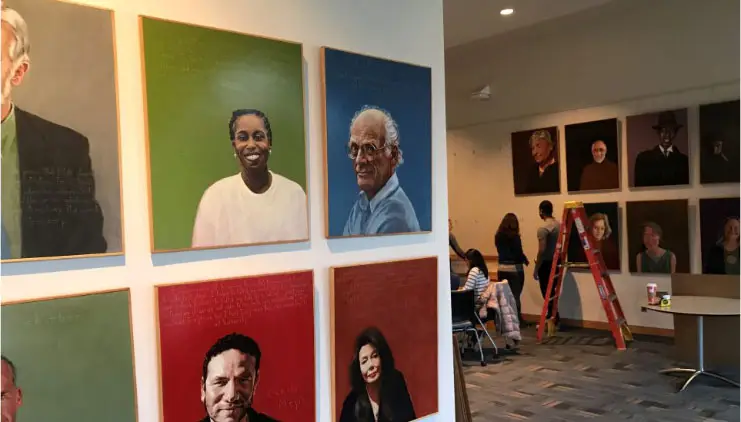
Sister Helen Prejean
Sister Helen Prejean
Nun, Anti-Death Penalty Activist : b. 1939
“We are all worth more than the worst thing we’ve ever done.”
Biography
The debate swirling around the death penalty is heated, with emotional arguments coming from both sides. One clear, powerful voice cuts through the politics to say, “We are all worth more than the worst thing we’ve ever done.”
Sister Helen Prejean was born on April 21, 1939, in Baton Rouge, Louisiana. At age 18, she committed to a life of ministry as a nun in the Roman Catholic Church. At first, it appeared her religious vocation would center on education. She studied English and Education at St. Mary’s Dominican College and later earned a master’s degree in Religious Education from St. Paul’s University in Ottawa, Canada. She taught junior and senior high school students, served as the Religious Education Director at St. Frances Cabrini Parish in New Orleans, and became the Formation Director for her religious community.
In 1982, an acquaintance invited Prejean to exchange letters with Elmo Patrick Sonnier, a convicted murderer who’d been sentenced to death by electrocution. She visited him at the Louisiana State Penitentiary, served as his spiritual counsel, and then attended his execution. The experience changed her mission as a nun. Because of Sonnier, she became a champion of the movement to abolish the death penalty. “I saw the suffering and I let myself feel it… I saw the injustice and was compelled to do something about it. I changed from being a nun who only prayed for the suffering world to a woman with my sleeves rolled up, living my prayer.” After a career spent working in local parishes, schools, and prisons, she began to build a national and global movement against the death penalty.
Prejean didn’t just speak up for death row inmates. She founded Survive, an organization to support families of murder victims in New Orleans. She undertook policy work to push for change, including serving on the board of the National Coalition to Abolish the Death Penalty from 1985–1995, and as Chairperson of the Board from 1993–1995. She is also a member of Amnesty International and an honorary member of Murder Victim Families for Reconciliation.
In 1993, Prejean published her first book, Dead Man Walking: An Eyewitness Account of the Death Penalty, about her experiences with Sonnier and another convicted murderer, Robert Lee Willie. Through her writing, Prejean educated millions of people all over the world about the injustices she’d witnessed in the criminal justice system. The book was a New York Times and international bestseller translated into ten languages. It was adapted into a movie starring Susan Sarandon, an opera, and a stage play. In 2025, artist Catherine Anyango Grünewald and writer Rose Vines, released a graphic edition of the book.
In 2004, Prejean published her second book, The Death of Innocents: An Eyewitness Account of Wrongful Executions. In this book, her subjects are Dobie Gillis Williams and Joseph O’Dell, two men she believes to be innocent of the crimes for which they were executed. Because of lawyer error and courtroom technicalities, critical evidence was never heard in court. Prejean’s book examines the evidence jurors never heard and concludes that the way the justice system works leads directly to the execution of innocent people. In other words, beyond the issue of whether execution as punishment is right or wrong, she argues that the system itself is so flawed that an execution can never be just. In addition to frequent false convictions, a disproportionate number of poor Americans reside on death row. She writes that “the death penalty is a poor person’s issue. Always remember that: after all the rhetoric that goes on in legislative assemblies, in the end, when the deck is cast out, it is the poor who are selected to die in this country.”
In a third book, River of Fire: My Spiritual Journey (2019), Prejean tells the compelling story of her life leading up to the publication of Dead Man Walking.
In January 2016, when Prejean met Pope Francis, she delivered a letter from Richard Glossip. Glossip is awaiting execution in Oklahoma for commissioning a 1997 murder, despite a complete lack of physical or forensic evidence to prove his involvement. And three years later, not long after meeting with Sister Helen in August of 2018, Pope Francis announced new language of the Catholic Catechism declaring the death penalty to be inadmissible, an attack on the inviolability and dignity of the person, with no exceptions.
For Prejean, raising awareness and shedding light on the practice of the death penalty is what ultimately will cause citizens to stand up and fight against the injustice. “I know it is not a question of malice or ill will or meanness of spirit that prompts our citizens to support executions. It is, quite simply, that people don’t know the truth of what is going on. That is not by accident. The secrecy surrounding executions makes it possible for executions to continue. I am convinced that if executions were made public, the torture and violence would be unmasked, and we would be shamed into abolishing executions.”
Decades after her first meeting with Patrick Sonnier at the Louisiana State Penitentiary, Prejean has not slowed down or quieted her voice. As of early 2025, at age eighty-six, she maintains a busy schedule of speaking, virtually and all over the United States, sharing her message of dignity, compassion, and justice.
Programs
Americans Who Tell the Truth (AWTT) offers a variety of ways to engage with its portraits and portrait subjects. Host an exhibit, use our free lesson plans and educational programs, or engage with a member of the AWTT team or portrait subjects.

Education
AWTT has educational materials and lesson plans that ask students to grapple with truth, justice, and freedom.

Exhibits & Community Engagement
AWTT encourages community engagement programs and exhibits accompanied by public events that stimulate dialogue around citizenship, education, and activism.